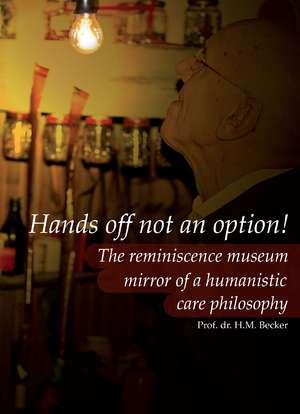Hands Off Not an Option!: The Reminiscence Museum: Mirror of a Humanistic Care Philosophy
Autor Hans Marcel Beckeren Mixed media product – 15 iun 2011
The book includes 1 DVD.
Preț: 181.68 lei
Nou
Puncte Express: 273
Preț estimativ în valută:
34.76€ • 36.37$ • 28.88£
34.76€ • 36.37$ • 28.88£
Carte indisponibilă temporar
Doresc să fiu notificat când acest titlu va fi disponibil:
Se trimite...
Preluare comenzi: 021 569.72.76
Specificații
ISBN-13: 9789059724129
ISBN-10: 9059724127
Pagini: 272
Ilustrații: 120 color plates, 1 DVD
Dimensiuni: 170 x 239 x 25 mm
Greutate: 0.82 kg
Editura: Eburon Academic Publishers
Colecția Eburon Academic Publishers
ISBN-10: 9059724127
Pagini: 272
Ilustrații: 120 color plates, 1 DVD
Dimensiuni: 170 x 239 x 25 mm
Greutate: 0.82 kg
Editura: Eburon Academic Publishers
Colecția Eburon Academic Publishers
Notă biografică
Hans M. Becker is emeritus professor of the humanizing of care at Utrecht University for Humanistics and former CEO of the Humanitas Foundation Rotterdam, which oversees a group of senior care facilities with more than two thousand clients.
Cuprins
Foreword
Jet Bussemaker, State Secretary of Health, Welfare and Sports
Introduction and Acknowledgements for the English Edition
1. The dilemma in contemporary elderly care
2. The importance of creating a social network
3. The reminiscence museum and “reminiscing”
4. The influence of the reminiscence museum on social networking
5. How to successfully employ volunteer workers in the reminiscence museum
6. Acquisition of objects, smells, audio and video material
7. Creating the necessary space: where to situate the museum collection?
8. How to design a display of objects
9. The pros and cons of sizable and modest facilities
10. Economic aspects of a reminiscence museum
11. Outcome of observations, life stories and entries from the guestbook
12. Possible inconsistencies
13. The multi-cultural connecting element of the museum
14. The influence of the reminiscence museum on the image of care institutions: “temples of vivacious culture and reminiscence” instead of “misery islands as waiting-rooms of death”
Appendix
"Harvest" from the guestbook, and other reactions
The hot water bottle and foot stoves collection
The wheelchair collection
Some examples of museum ground plans
The Humanitas philosophy
A vision on volunteer workers
Summary of the yes-culutre
The corporate story of Humanitas
Bibliography
Biography of Professor Hans Marcel Becker
Jet Bussemaker, State Secretary of Health, Welfare and Sports
Introduction and Acknowledgements for the English Edition
1. The dilemma in contemporary elderly care
2. The importance of creating a social network
3. The reminiscence museum and “reminiscing”
4. The influence of the reminiscence museum on social networking
5. How to successfully employ volunteer workers in the reminiscence museum
6. Acquisition of objects, smells, audio and video material
7. Creating the necessary space: where to situate the museum collection?
8. How to design a display of objects
9. The pros and cons of sizable and modest facilities
10. Economic aspects of a reminiscence museum
11. Outcome of observations, life stories and entries from the guestbook
12. Possible inconsistencies
13. The multi-cultural connecting element of the museum
14. The influence of the reminiscence museum on the image of care institutions: “temples of vivacious culture and reminiscence” instead of “misery islands as waiting-rooms of death”
Appendix
"Harvest" from the guestbook, and other reactions
The hot water bottle and foot stoves collection
The wheelchair collection
Some examples of museum ground plans
The Humanitas philosophy
A vision on volunteer workers
Summary of the yes-culutre
The corporate story of Humanitas
Bibliography
Biography of Professor Hans Marcel Becker
